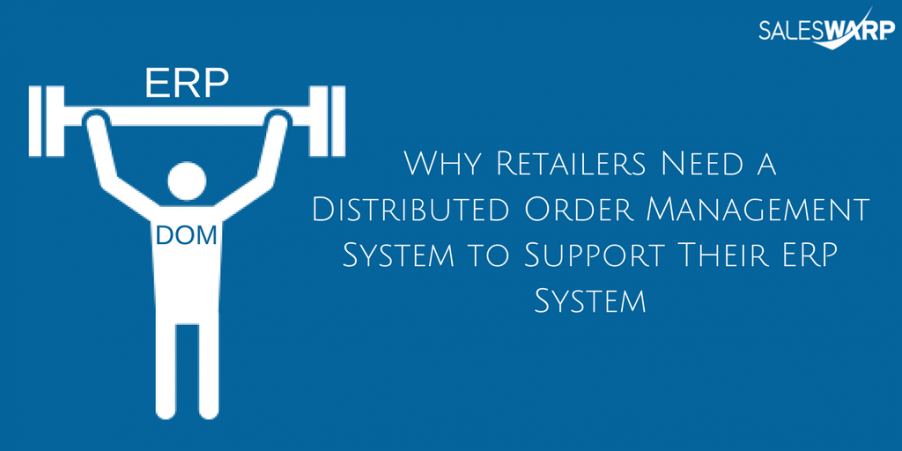Why Retailers Need a Distributed Order Management System to Support Their ERP System
What is ERP (Enterprise Resource Planning) and Why is ERP Software Important?
The acronym ERP stands for Enterprise Resource Planning. It refers to the systems and software packages used by organizations to manage day-to-day business operations such as project management, product management, manufacturing, procurement, sales, and accounting. ERP software integrates the various systems associated with these operations, thus providing consolidated data in one, single database.
ERP software helps businesses improve productivity, increase efficiencies, decreases costs, and streamline processes by providing accurate and timely information; thus, eliminating redundant processes and duplicate data. The benefits of implementing ERP software can be profound, especially if supported by additional technology.
Why Retailers Need a Distributed Order Management System to Support Their ERP System
While most medium and large retailers may have an ERP system in place, there’s still a need for a DOM (Distributed Order Management) system. Why? An ERP system is the backbone of a business – it manages the processes and assets of various departments that are static and unlikely to change – such as purchasing cycles, store locations, accounting functions, etc. A cloud-based DOM system manages processes that are dynamic, such as customer demands, new marketplaces, and other industry trends.
ERP systems are slow to change due to the cost and time investment required to build out these new functionalities. Unlike ERP systems, DOM systems have the flexible architecture required to quickly and affordably build out new functionalities as industry and customer demands evolve.
In this blog, we’ve highlighted common changes that occur within the retail industry, and why a DOM system is better equipped to handle these changes than an ERP system.
Dynamically Changing Processes
ERP systems cannot possibly encompass all the functionalities of a business, so when they are built, they are built to manage broad or specific processes. Some of the most common ERP modules include those for product planning, material purchasing, inventory control, etc. Therefore, when new processes need to be established, new ERP functionalities need to be built, which is expensive and time-consuming. This makes it difficult for an ERP system to dynamically adapt to changing processes that frequently occur due to an ever-changing industry such as retail.
Due to changing customer demands, a process that has changed significantly in the past few years is the fulfillment process. In the early days of ecommerce, orders were typically fulfilled from a distribution center. Now, however, there are many different methods of fulfillment used to meet customer expectations of fast and cheap shipping, such as ship-from-store, in-store pickup, dropshipping, etc.
Accommodating these new fulfillment processes with an ERP system means that new functionalities need to be built, which can be extremely expensive and slow to implement. A DOM system is better equipped to handle these dynamically changing processes due to its flexible architecture, which makes building new processes faster, easier, and (relatively speaking) cheaper.
Marketplace Changes
Aside from the dynamic process changes, there are also several marketplace changes that significantly affect retail operations as well. If an ERP system was built more than a couple of years ago, it might have been built to sell on a marketplace such as Overstock.com, but not on Walmart.com. Five years ago, no one would have ever thought that Walmart would be the next big marketplace or that Overstock would no longer be a top marketplace.
Again, to update an ERP system with a Walmart integration would be costly and time-consuming. By the time the functionality is built, there may even be a new marketplace to connect. A DOM system can build out new marketplace integrations quickly and easily, enabling retailers to sell on whatever new marketplace pops up next.
Evolving Customer Expectations
Processes change, new marketplaces arise, and customer expectations evolve and become more sophisticated. ERP systems are sufficient in handling back-end business processes – accounting, HR, procurement, etc. However, a DOM system specializes in managing customer-facing business processes, or omnichannel services. These are the services that customers now demand – buy online pick up in-store, loyalty programs, search in-store products online, return products across channels, pricing consistency across channels, etc.
Conclusion
ERP systems are crucial to running a business; however, they can significantly slow retailers down when they are not supported by the right technology. DOM systems can bridge the gap between an ERP system and the ever-changing retail landscape. This helps retailers keep up with dynamic processes, a transforming industry, and evolving customer expectations, thus giving retailers the competitive edge they need to survive in the ultra-competitive retail marketplace.
If you want to learn more about SalesWarp and how our technology can leverage your current ERP system, give us a call.

